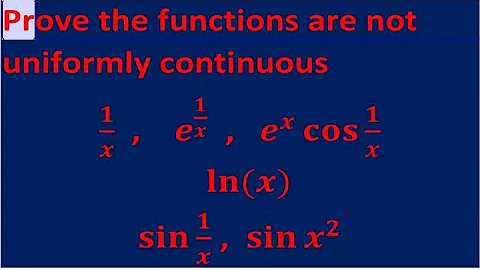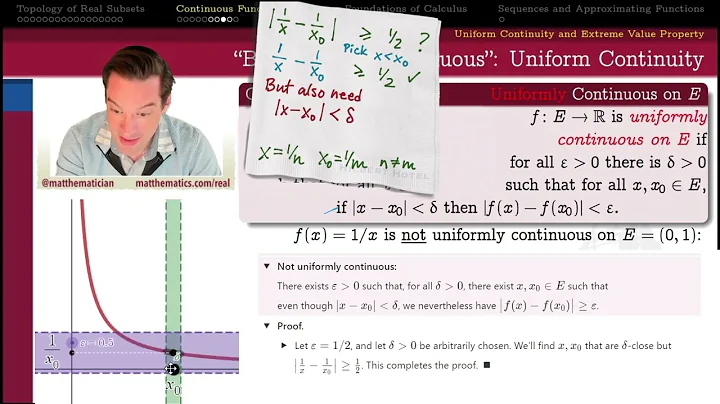Prove That F X X2 is Not Uniformly Continuous on 0 1
Proving $f(x)=1/x$ on $(0,1 )$ is not uniformly continuous
Solution 1
To use the result you cite, $h$ must be a constant. It cannot depend on $x$. Your argument is that no matter how small $|x_1-x_2|$ is, $$\left|\frac{1}{x}-\frac{1}{x+x^2}\right|=\left|\frac{x^2}{x^2(x+1)}\right|=\left|\frac{1}{1+x}\right|$$ is close to $1$ as $x$ is close to zero. This will work, but you need to use the $\epsilon$-$\delta$ formalism to prove it (or use the result).
Solution 2
you can use another mehtod to show f(x)=1/x is not uniformly continuous on (0,1) let define :${ x }_{ n }=\frac { 1 }{ n+1 } ,{ y }_{ n }=\frac { 1 }{ n+1+\varepsilon } $ $$\left| { x }_{ n }-{ y }_{ n } \right| =\frac { \varepsilon }{ \left( n+1 \right) \left( n+1+\varepsilon \right) } \rightarrow 0 $$ $when$ $n\rightarrow \infty $ however,$$\\ \\ \quad \\ \left| f\left( { x }_{ n } \right) -f\left( { y }_{ n } \right) \right| =\left| n+1-n-1-\varepsilon \right| =\varepsilon .\forall \varepsilon >0\\ $$ which shows f(x) is not not uniformly continuous
Solution 3
Here's another proof that might make it more obvious.
All we have to show is that for any $\varepsilon > 0$ and any $\delta > 0$, we can find points $p,q \in (0,1)$ such that $|p-q| < \delta$ and $\left|\frac{1}{p}-\frac{1}{q} \right| > \varepsilon$.
Just take $q = \frac{p}{2}$: now the conditions are $\frac{p}{2} < \delta$ and $\varepsilon < \frac{1}{p}$, and both will be satisfied when $0 < p < min\left\{ 2\delta, \frac{1}{\varepsilon}, 1 \right\}$.
Related videos on Youtube
Comments
-
My questions are about the reasoning made in the note http://folk.uib.no/st00895/MAT112-V12/unif-kont.pdf (which is in Norwegian).
To prove that $f(x)=\frac{1}{x}$ is not uniformly continuous, the authors use the following "result" (Sats 2.12 in the note, which I translate below):
Result 2.12: If for every $h>0$ we have that $|f(x+h)-f(x)|$ is unbounded on $I$, then $f$ is not uniformly continuous on $I$.
Proof: The result follows directly from the definition of uniform continuity.
In Example 2.14 (Eksempel 2.14), the authors look at
$$|f(x+h)-f(x)|=\left|\frac{1}{x+h}-\frac{1}{x}\right|=\left|\frac{h}{x(x+h)}\right|.$$ They then claim that the above quantity is not bounded for any $h>0$, since
$$\lim_{x\rightarrow 0}\left|\frac{h}{x(x+h)}\right|=\infty.$$
Question 1: Is it not possible to choose $h=x^2$, thereby obtaining
$$\frac{h}{x(x+h)}=\frac{1}{\frac{x}{h}(x+h)}=\frac{1}{x(1/x+1)}=\frac{1}{x(1/x+1)}=\frac{1}{1+x}\rightarrow1 \text{ as }x\rightarrow 0.$$
Therefore, |f(x+h)-f(x)| is not unbounded, so we cannot use the result "Result 2.12". Is my argumentation correct?? Is it OK to choose $h$ like I have done?
Question 2: However, it seems correct to me that my argumentation is all you need to prove that $f(x)=\frac{1}{x}$ is not uniformly continuous on (0,1). Here $x_1=x,x_2=x+x^2$, so that $|x_1-x_2|$ can be made arbitrarily small. However $|f(x_1)-f(x_2)|=1$, which stays the same regardless of how small we make $|x_1-x_2|$. Is this correct?
-
No it is not possible to choose $h$ depending on $x$ hence the authors are quite correct.
-
The point about uniform continuity is that $h$ is independent of the values of $x$ you're choosing.
-
Did you try to write down details of the proof of Result 2.12 yourself? If you do, it might make things more clear.
-
-
Thanks, @Alex S. How do you see that $h$ cannot depend on $x$? I also see some other comments saying that this is not possible, and that this is the point about uniform continuity. How can then some of my argumentation be correct (i.e the second part you comment on where $h=x^2$) ? Could you please explain?
-
The comment that $h>0$ means that $h$ comes from some ordered set. Since this is an analysis question, it is reasonable to expect that that ordered set is the reals. Therefore $h\in \mathbb R$. To show that this function is not uniformly continuous, you have to show that there exists $\varepsilon$ such that for all $\delta$, there exist $x_1$, $x_2$ such that $|x_1-x_2|<\delta$, but $|f(x_1)-f(x_2)|\not <\varepsilon$. Your choice of $x_1$ and $x_2$ work if you carefully choose $\varepsilon$.
-
It is unnecessary to show that the inequality holds for "any $\varepsilon > 0$". The logical negation of the definition of uniform continuity is "there exists $\varepsilon > 0$"...
-
Is there a general method to find the two sequences with the desired property for different $f(x)$ to prove absence of uniform continuity?
-
Sequential criterion for non-uniform continuity. brilliant! I kept trying to find an expression in delta that bounds the value of x between 0 and 1, which proved impossible because the bound has to be maintained for all real delta. The attempt given below does not quite work. Thanks!
Recents
Related
Source: https://9to5science.com/proving-f-x-1-x-on-0-1-is-not-uniformly-continuous





0 Response to "Prove That F X X2 is Not Uniformly Continuous on 0 1"
Post a Comment